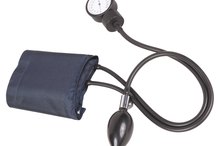Types of Joints in the Skeletal System
A joint is the connection between two bones. The skeletal system is made of different types of joints, including fibrous, cartilagenous and synovial. A ligament holds fibrous joints together. Cartilage joints are bones held together with a connection of cartilage. A synovial capsule surrounds the synovial joints. Synovial joints are the largest number of joint types in the skeletal system. Each joint type has a specific method of movement.
Fibrous Joint
The fibrous (fixed or immovable) joints in the skeletal system include the sutures of the skull. The coronal suture connects the parietal and frontal skull bones. The sagittal suture connects the two parietal bones. The lambdoid suture unites the parietal with the occipital.
- The fibrous (fixed or immovable) joints in the skeletal system include the sutures of the skull.
- The sagittal suture connects the two parietal bones.
Cartilagenous Joint
Pivot Joints in the Skeletal System
Learn More
Cartilagenous joints are partially movable joints consisting of symphyses or synchondroses joints. Examples of cartilagenous types of joints include the rib cage and the spinal column.
Ball-and-Socket Joint
Mercksource.com, an online medical dictionary, describes a ball-and-socket joint as one in which the rounded surface of a bone fits into and moves within a cup-shaped depression. Examples of this type of synovial joint are the hip and shoulder joints. The ball-and-socket joint allows freedom of movement up, down, right, left and in a full 360-degree rotation.
Saddle Joint
Types of Gliding Joints
Learn More
The saddle joint is a biaxial joint that allows movement on two planes--flexion/extension and abduction/adduction. The thumb is the only bone structure in the human body with a saddle joint.
Hinged Joint
Hinged joints include the elbow, fingers, toes and knee. Movement occurs in only one direction or one plane. Innerbody.com states that the hinged joint in the knee is unusual because it allows the knee to swivel, turning the foot from side to side.
Gliding Joint
Gliding joints allow two or more flat or slightly rounded bones to move easily together without friction or grinding. Enotes.com, an online nursing encyclopedia, states the function of a gliding joint is to allow motions such as smooth sliding of bone past bone, bending, stretching and circular motion. Examples of gliding joints include the forearm to wrist joint and the lower leg to ankle joint.
Pivot Joint
A pivot joint is a synovial joint designed with one end fitting like a cylinder inside a ring. Pivot joints at the base of the skull allow the head to rotate. Other pivot points allow the rotation of the palm.
Condyloid Joint
Condyloid joints are biaxial joints that permit up, down and side-to-side motions. Medical-look.com lists the radiocarpal joint in the wrist as an example of a condyloid joint.
Related Articles
References
- Merck Source: Ball-and-Socket Joint
- InnerBody: Human Joints and Mechanical Equivalents - Hinge Joints
- Stanford Children's Health. Anatomy of a Joint.
- Juneja P, Hubbard JB. Anatomy, joints. In: StatPearls. Updated December 19, 2018.
- Tortora & Derrickson () Principles of Anatomy & Physiology, 12th Edition, Pub: Wiley & Sons
- BBC. Types of Joint Movement - Skeletal System.
- Arthritis Foundation. Osteoarthritis.
Resources
Writer Bio
Norene Anderson has been a writer since 2003. She is also a registered nurse with expertise in a wide range of medical conditions and treatments. Anderson received her associate degree in nursing from Lincoln University in Jefferson City, Mo.








